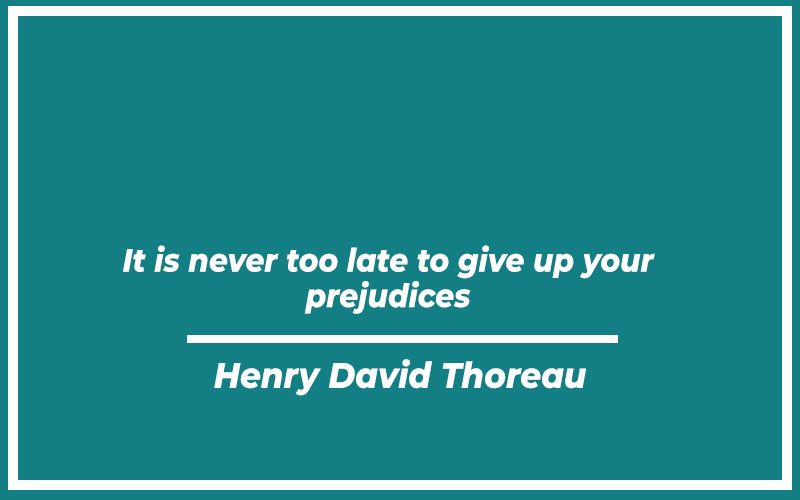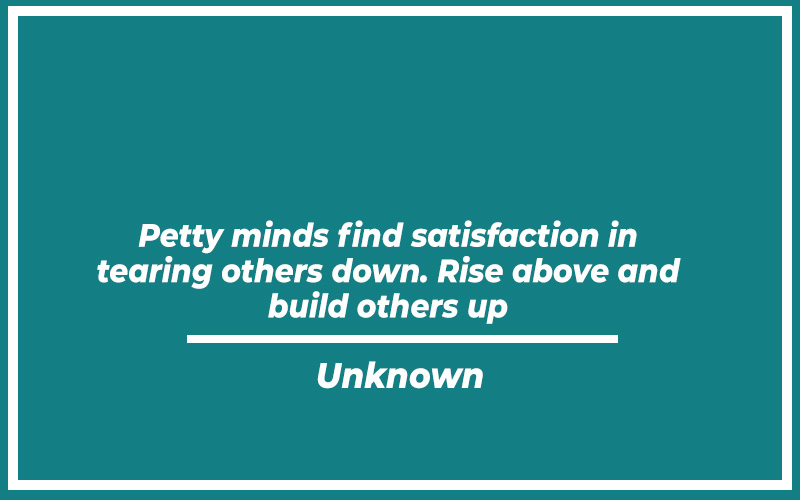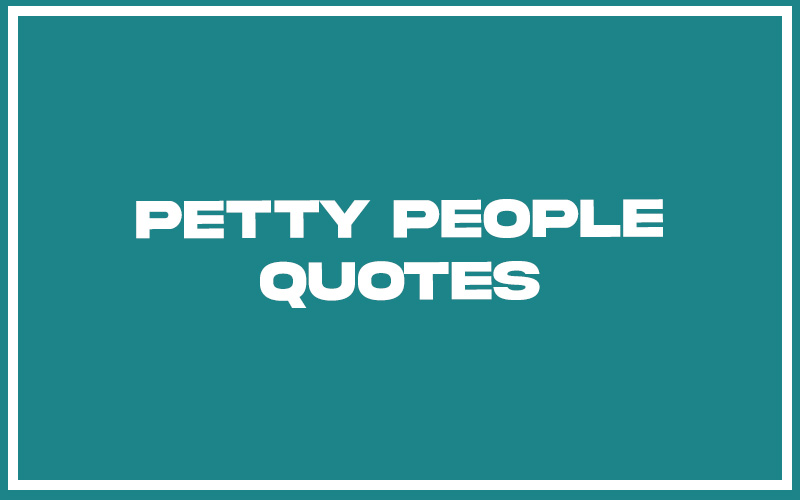If you’ve ever found yourself shaking your head at the small-minded actions of others, then quotes about petty people will strike a chord with you.
These quotes shed light on the frustrating yet sometimes comical nature of pettiness in human behavior. Whether it’s a coworker who sweats the small stuff or a friend who can’t let go of minor slights, petty people quotes can offer a humorous or reflective perspective on dealing with such individuals.
As you explore these quotes, they can help you navigate interactions with a light heart and a clearer understanding, reminding you not to get caught up in the trivial.
Best Petty People Quotes

“It is never too late to give up your prejudices.” – Henry David Thoreau
Henry David Thoreau’s profound statement reminds us that personal growth and the abandonment of prejudicial views are always possible, regardless of one’s stage in life. This encouragement towards ongoing self-improvement and open-mindedness highlights the capacity for change and adaptation in human nature.
Thoreau’s advice serves as a call to continually reassess and expand our perspectives, fostering a more inclusive and understanding approach to the diverse world around us. It’s a powerful reminder that evolution of thought is not just a possibility but a responsibility.
Also Read: Rainbow Bridge Quotes (with Explanation)
“The less people know, the more stubbornly they know it.” – Rajneesh
Rajneesh captures the essence of intellectual arrogance with this quote. It suggests that ignorance often accompanies a disproportionate confidence in one’s knowledge. This paradoxical observation encourages humility and continuous learning, highlighting the dangers of complacency in personal development.
It’s a critique of the all-too-common human trait where scant information leads to inflexible opinions, suggesting that true wisdom involves acknowledging the limits of one’s understanding and remaining open to new ideas and viewpoints.
“An open mind is better than a clenched fist.” – Matshona Dhliwayo
Matshona Dhliwayo uses a vivid metaphor to compare the virtues of openness with the destructiveness of conflict. An open mind, symbolizing peace and receptivity, facilitates dialogue and understanding, whereas a clenched fist represents aggression and closed-mindedness.
This quote advocates for approaching life and interactions with openness rather than hostility, suggesting that embracing diverse perspectives leads to richer experiences and resolutions, promoting peace over conflict.
“Petty minds dwell on the past; wise minds focus on the future.” – Unknown
This quote emphasizes the importance of perspective in personal growth and mental well-being. It contrasts petty individuals who get bogged down by past grievances with wise individuals who invest their energy in future possibilities.
Encouraging a forward-thinking mindset, it suggests that focusing on potential and progress rather than past hurts leads to a more productive and fulfilling life. This forward focus is presented as a key attribute of wisdom and a healthier, more strategic approach to life.
“Life is too precious to waste on petty grudges. Choose forgiveness and move forward.” – Unknown
Highlighting the fleeting nature of life, this quote urges letting go of insignificant conflicts and choosing a path of forgiveness. It points out that holding grudges can consume valuable time and emotional energy that could be better spent on positive pursuits.
Forgiveness is framed not only as a moral choice but as a practical strategy for living a happier, more contented life, freeing oneself from the weight of past offenses to embrace a future filled with peace and positivity.
“A petty person sees enemies everywhere; a compassionate person sees opportunities for connection.” – Unknown
This quote contrasts the outlooks of petty versus compassionate individuals. While petty people are on constant alert, seeing threats and adversaries in everyday interactions, compassionate people approach the world with openness, seeing opportunities to connect and build relationships.
This serves as a lesson on the impact of one’s attitude towards others on one’s overall experience of life, promoting compassion over suspicion and highlighting the benefits of seeking common ground and fostering understanding.
“Being petty may feel satisfying momentarily, but it leaves a bitter aftertaste.” – Unknown
Acknowledging the temporary pleasure that petty actions may provide, this quote warns of the lasting negativity they engender. It serves as a caution against indulging in small-minded behaviors, which, while perhaps providing immediate gratification, ultimately lead to feelings of regret and dissatisfaction.
The advice is to rise above petty impulses and strive for higher ground, focusing on actions that bring long-term happiness and peace rather than fleeting triumphs. This approach promotes maturity and emotional intelligence in handling conflicts and personal interactions.
“Respond intelligently even to unintelligent treatment.” – Lao Tzu
Lao Tzu’s wisdom emphasizes the importance of maintaining composure and intellect in the face of provocation or ignorance. This quote encourages the practice of thoughtful response over reactive emotion, advocating for a higher standard of personal conduct regardless of others’ behavior.
It suggests that true intelligence and strength are demonstrated by the ability to engage respectfully and thoughtfully, even when others do not.
“Never let somebody’s drama determine the outcome of your day.” – Terry Mark
Terry Mark’s quote is a reminder of the importance of personal agency in emotional well-being. It suggests that individuals should not allow others’ negative behaviors or attitudes to influence their mood or decisions.
By recommending detachment from external drama, the quote promotes maintaining focus on one’s own goals and happiness, effectively managing emotional health and safeguarding one’s peace of mind.
“Do not be threatened by rude people, because rudeness is a sign of insecurity.” – Gift Gugu Mona
Gift Gugu Mona provides insight into the roots of discourteous behavior, linking it to the perpetrator’s insecurities rather than the recipient’s deficiencies.
This quote encourages understanding and patience in dealing with rude individuals, suggesting that their behavior is more about their internal struggles than about those they target. It promotes compassion over retaliation, aiming to foster more peaceful interactions.
“A person who is nice to you, but rude to the waiter, is not a nice person.” – Dave Barry
Dave Barry’s quote underscores the importance of consistency in kindness, asserting that true character is revealed in how one treats everyone, not just those from whom one has something to gain.
It encourages us to evaluate people based on their actions across different contexts, promoting a more comprehensive assessment of character.
“If they do it often, it isn’t a mistake; it’s just their behavior.” – Dr. Steve Maraboli
Dr. Steve Maraboli highlights the distinction between an occasional slip and a habitual action. This quote suggests that repeated behavior is a reflection of a person’s true nature rather than an accidental occurrence.
It encourages accountability and awareness in both personal reflection and in our expectations of others, advocating for recognizing patterns in behavior as indicators of deeper character traits.
“Petty laws breed great crimes.” – Ouida
Ouida’s quote critiques the effect of minor, overly restrictive laws on societal behavior, suggesting that they can provoke more significant legal offenses.
This perspective promotes a reevaluation of legal and regulatory systems to ensure they are just and proportionate, avoiding unnecessary harshness that could lead to greater resistance and wrongdoing.
“The lion does not turn around when a small dog barks.” – African Proverb
This African proverb uses the imagery of a lion and a small dog to illustrate the power of ignoring minor annoyances. It suggests that true strength lies in recognizing what warrants attention and what does not.
By not reacting to every provocation, one conserves energy and maintains dignity, embodying the confidence and calm of a lion undisturbed by trivial disturbances.
“It is never too late to give up your prejudices.” – Henry David Thoreau
Henry David Thoreau’s quote serves as an encouraging reminder that it’s always possible to change and evolve beyond our biases. This statement underlines the potential for personal growth regardless of one’s age or past beliefs.
Thoreau is advocating for continual self-improvement and a willingness to abandon outdated or harmful prejudices that can impede personal and societal progress. The quote promotes introspection and change as ongoing processes, essential for personal development and a more harmonious society.
“The less people know, the more stubbornly they know it.” – Rajneesh
Rajneesh addresses the phenomenon where ignorance often breeds a false sense of certainty. This quote suggests that limited knowledge can lead to overconfidence, where individuals cling to their beliefs more tenaciously without a broader understanding to challenge them. It’s a critique of intellectual arrogance and a call to pursue deeper knowledge and openness.
The advice encourages humility and continuous learning as antidotes to ignorance and stubbornness, promoting an educational journey that enhances understanding and reduces unwarranted confidence in poorly supported beliefs.
“An open mind is better than a clenched fist.” – Matshona Dhliwayo
Matshona Dhliwayo’s metaphor highlights the benefits of openness versus aggression. An open mind, symbolizing peace and receptivity, facilitates understanding and cooperation, whereas a clenched fist represents conflict and resistance. This quote advocates for resolving disagreements and advancing progress through dialogue and understanding rather than force or confrontation.
It promotes peace and collaborative problem-solving as more effective and humane approaches to dealing with differences, suggesting that these methods lead to better and more sustainable outcomes.
“Respond intelligently even to unintelligent treatment.” – Lao Tzu
Lao Tzu’s wisdom teaches the value of maintaining composure and responding thoughtfully, even when faced with ignorance or irrationality. This quote emphasizes the importance of self-control and the intellectual discipline required to engage constructively, regardless of how others may act.
It suggests that one’s response to adversity or provocation can demonstrate greater wisdom and character than simply reacting in kind. By choosing intelligent responses, we can elevate our interactions and potentially guide others towards more rational and respectful communication.
“Never let somebody’s drama determine the outcome of your day.” – Terry Mark
Terry Mark reminds us that we have the power to control our reactions to external influences, including other people’s conflicts or emotional turmoil. This quote encourages individuals not to let the negative behavior of others impact their peace of mind or emotional well-being.
It advocates for a proactive approach to maintaining one’s calm and focus, emphasizing personal agency in emotional regulation and highlighting the importance of guarding one’s emotional space against unnecessary drama.
“Do not be threatened by rude people, because rudeness is a sign of insecurity.” – Gift Gugu Mona
Gift Gugu Mona offers a perspective on rudeness as a reflection of the rude person’s insecurities rather than a fault of those they target. This understanding can empower recipients of such behavior to react with empathy or disengagement rather than defensiveness or upset.
The quote encourages viewing rude behavior as a personal issue of the aggressor, which can help maintain personal peace and reduce the emotional impact of such encounters.
“A person who is nice to you, but rude to the waiter, is not a nice person.” – Dave Barry
Dave Barry’s quote underscores the importance of consistency in kindness, suggesting that how someone treats those from whom they have nothing to gain is more revealing of their character than how they treat peers or superiors.
This observation prompts us to consider the authenticity and integrity of our relationships. It serves as a reminder to evaluate people based on their behavior in various contexts, promoting a holistic view of character that values universal respect and decency.
“Petty actions reveal a lack of depth and emotional intelligence.” – Unknown
This quote suggests that engaging in petty behavior is indicative of superficial character and limited emotional awareness. Such actions often stem from an inability to understand or manage one’s emotions effectively, leading to small-minded reactions to conflicts or challenges.
The commentary encourages personal growth and the development of emotional intelligence as means to transcend petty tendencies, advocating for maturity and depth in handling interpersonal interactions. It underlines the importance of cultivating self-awareness and empathy to foster more meaningful and respectful relationships.
“Choose grace over pettiness; it will always be the better choice.” – Unknown
Opting for grace rather than pettiness in difficult situations reflects strength and maturity. This quote promotes the virtues of dignity and poise when faced with conflict or provocation. By choosing grace, individuals demonstrate superior character and integrity, setting a positive example for others and often defusing potential negativity.
This approach not only enhances personal reputation but also contributes to a more respectful and constructive interaction environment, advocating for a measured and thoughtful response as a means of overcoming petty disputes.
“Petty minds focus on flaws; enlightened minds appreciate the beauty in imperfections.” – Unknown
Highlighting the contrast between petty and enlightened perspectives, this quote suggests that where petty individuals concentrate on shortcomings, those with wisdom find value in the imperfect. It encourages embracing imperfections not only in oneself but also in others and the world around us, promoting acceptance and appreciation over criticism and judgment.
This mindset fosters a more compassionate and understanding approach to life, enhancing personal happiness and improving interpersonal relations.
“Being petty is a waste of your energy and potential. Redirect it towards something meaningful.” – Unknown
Petty behavior is often a misdirection of one’s capabilities and energy that could be better spent on more productive endeavors. This quote advises recognizing the futility of petty actions and suggests channeling one’s efforts into pursuits that are enriching and constructive.
It encourages personal development and the pursuit of goals that contribute positively to one’s life and the lives of others, promoting a focus on self-improvement and meaningful engagement over trivial disputes.

“Petty minds find satisfaction in tearing others down. Rise above and build others up.” – Unknown
This quote criticizes the destructive nature of petty individuals who derive pleasure from undermining others. It contrasts this negative behavior with the noble act of supporting and uplifting those around us.
The commentary promotes positivity and altruism, encouraging individuals to contribute to the growth and success of others rather than engaging in harmful or spiteful actions. By focusing on positive interactions and support, one can foster a more supportive and productive community.
“The truly confident have no need to engage in petty battles.” – Unknown
True confidence is characterized by a sense of security that negates the need to prove oneself through petty conflicts. This quote suggests that those who are genuinely self-assured are less likely to engage in minor squabbles because they are comfortable with themselves and their positions.
It promotes the development of genuine self-esteem and confidence as shields against the allure of petty confrontations, advocating for self-assurance that comes from within rather than from external validation.
“Don’t let someone’s pettiness distract you from your own greatness.” – Unknown
This quote serves as a reminder not to allow the negative behavior of others to detract from one’s own achievements and self-worth. It suggests maintaining focus on one’s goals and virtues in the face of petty provocations.
By emphasizing personal greatness and the pursuit of one’s aspirations, the commentary encourages individuals to overlook trivial annoyances and remain oriented towards their broader life objectives, advocating for resilience and determination in the pursuit of personal success.
Also Read: Aura Quotes (with Explanation)
Final Thoughts
Petty people quotes not only provide a laugh or two at the absurdity of small grievances but also offer wisdom on rising above the minor irritations in life.
As you reflect on these insights, let them remind you of the importance of focusing on what truly matters. Remember, life is too big and too rich to be diminished by pettiness.
Let these quotes inspire you to maintain your composure and sense of perspective, ensuring that you invest your energy in pursuits—and relationships—that are truly worthwhile.

